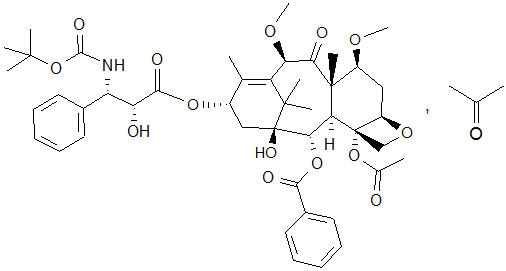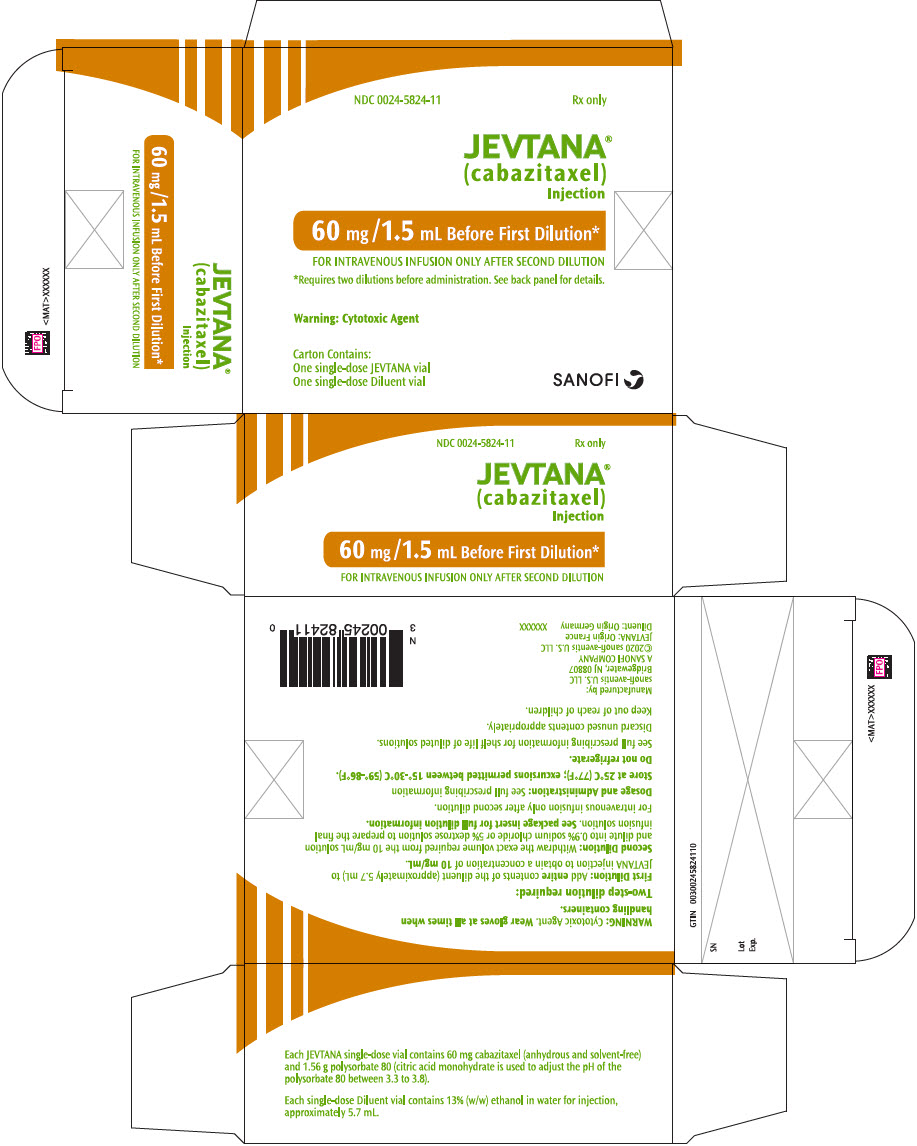Jevtana
Generic name: cabazitaxel
Drug class: Mitotic inhibitors
Medically reviewed by A Ras MD.
What is Jevtana?
Jevtana is a prescription medicine used with the steroid medicine prednisone. Jevtana is used to treat men with castration-resistant prostate cancer (prostate cancer that is resistant to medical or surgical treatments that lower testosterone) that has spread to other parts of the body, and that has worsened (progressed) after treatment with other medicines that included docetaxel.
It is not known if Jevtana is safe and effective in children.
Description
JEVTANA (cabazitaxel) injection is an antineoplastic agent belonging to the taxane class that is for intravenous use. It is prepared by semi-synthesis with a precursor extracted from yew needles.
The chemical name of cabazitaxel is (2α,5β,7β,10β,13α)-4-acetoxy-13-({(2R,3S)-3-[(tertbutoxycarbonyl) amino]-2-hydroxy-3-phenylpropanoyl}oxy)-1-hydroxy-7,10-dimethoxy-9-oxo-5,20-epoxytax-11-en-2-yl benzoate – propan-2-one (1:1).
Cabazitaxel has the following structural formula:

Cabazitaxel is a white to almost-white powder with a molecular formula of C45H57NO14C3H6O and a molecular weight of 894.01 (for the acetone solvate) / 835.93 (for the solvent free). It is lipophilic, practically insoluble in water and soluble in alcohol.
JEVTANA (cabazitaxel) injection 60 mg/1.5 mL is a sterile, non-pyrogenic, clear yellow to brownish-yellow viscous solution and is available in single-dose vials containing 60 mg cabazitaxel (anhydrous and solvent free) and 1.56 g polysorbate 80 (citric acid monohydrate is used to adjust the pH of the polysorbate 80 between 3.3 to 3.8).
Each mL contains 40 mg cabazitaxel (anhydrous) and 1.04 g polysorbate 80.
DILUENT for JEVTANA is a clear, colorless, sterile, and non-pyrogenic solution containing 13% (w/w) ethanol in water for injection, approximately 5.7 mL.
JEVTANA requires two dilutions prior to intravenous infusion. JEVTANA injection should be diluted only with the supplied DILUENT for JEVTANA, followed by dilution in either 0.9% sodium chloride solution or 5% dextrose solution.
Mechanism of Action
Cabazitaxel is a microtubule inhibitor. Cabazitaxel binds to tubulin and promotes its assembly into microtubules while simultaneously inhibiting disassembly. This leads to the stabilization of microtubules, which results in the inhibition of mitotic and interphase cellular functions.
What is the most important information I should know about Jevtana?
Jevtana may cause serious side effects including:
- Low white blood cells. Low white blood cells can cause you to get serious infections, and may lead to death. Men who are 65 years or older may be more likely to have these problems. Your healthcare provider:
- will do blood tests regularly to check your white blood cell counts during your treatment with Jevtana.
- may lower your dose of Jevtana, change how often you receive it, or stop Jevtana until your healthcare provider decides that you have enough white blood cells.
- may prescribe a medicine for you called G-CSF, to help prevent complications if your white blood cell count is too low.
Tell your healthcare provider right away if you have any of these symptoms of infection during treatment with Jevtana:- fever. Take your temperature often during treatment with Jevtana.
- cough
- burning on urination
- muscle achesAlso, tell your healthcare provider if you have any diarrhea during the time that your white blood cell count is low. Your healthcare provider may prescribe treatment for you as needed.
- Severe allergic reactions. Severe allergic reactions can happen within a few minutes after your infusion of Jevtana starts, especially during the first and second infusions. Your healthcare provider should prescribe medicines before each infusion to help prevent severe allergic reactions.
Tell your healthcare provider or nurse right away if you have any of these symptoms of a severe allergic reaction during or soon after an infusion of Jevtana:- rash or itching
- feeling dizzy or faint
- chest or throat tightness
- skin redness
- breathing problems
- swelling of your face
- Severe stomach and intestine (gastrointestinal) problems.
- Jevtana can cause severe vomiting and diarrhea, which may lead to death. Severe vomiting and diarrhea with Jevtana can lead to loss of too much body fluid (dehydration), or too much of your body salts (electrolytes). Death has happened from having severe diarrhea and losing too much body fluid or body salts with Jevtana. You may need to go to a hospital for treatment. Your healthcare provider will prescribe medicines to prevent or treat vomiting and diarrhea, as needed, with Jevtana.
Tell your healthcare provider right away if you develop vomiting or diarrhea or if your symptoms get worse or do not get better. - Jevtana can cause a leak in the stomach or intestine, intestinal blockage, infection, and bleeding in the stomach or intestine, which may lead to death.
Tell your healthcare provider if you develop any of these symptoms:- severe stomach-area (abdomen) pain
- constipation
- fever
- blood in your stool, or changes in the color of your stool
- Kidney failure. Kidney failure may happen with Jevtana, because of severe infection, loss of too much body fluid (dehydration), and other reasons, which may lead to death. Your healthcare provider will check you for this problem and treat you if needed.
Tell your healthcare provider if you develop these signs or symptoms:- swelling of your face or body
- decrease in the amount of urine that your body makes each day
- blood in your urine
- Lung or breathing problems. Lung or breathing problems may happen with Jevtana and may lead to death. Men who have lung disease before receiving Jevtana may have a higher risk for developing lung or breathing problems with Jevtana treatment. Your healthcare provider will check you for this problem and treat you if needed.
Tell your healthcare provider right away if you develop any new or worsening symptoms, including trouble breathing, shortness of breath, chest pain, cough or fever.
- Jevtana can cause severe vomiting and diarrhea, which may lead to death. Severe vomiting and diarrhea with Jevtana can lead to loss of too much body fluid (dehydration), or too much of your body salts (electrolytes). Death has happened from having severe diarrhea and losing too much body fluid or body salts with Jevtana. You may need to go to a hospital for treatment. Your healthcare provider will prescribe medicines to prevent or treat vomiting and diarrhea, as needed, with Jevtana.
Who should not use Jevtana?
Do not receive Jevtana if:
- your white blood cell (neutrophil count) is too low
- you have had a severe allergic reaction to cabazitaxel or other medicines that contain polysorbate 80. Ask your healthcare provider if you are not sure.
- you have severe liver problems
What should I tell my healthcare provider before using Jevtana?
Before receiving Jevtana, tell your healthcare provider about all your medical conditions, including if you:
- are over the age of 65
- had allergic reactions in the past
- have kidney or liver problems
- have lung problems
- are pregnant or plan to become pregnant. Jevtana can cause harm to your unborn baby and loss of pregnancy (miscarriage).
- are a male with a female partner who is able to become pregnant. Males should use effective birth control (contraception) during treatment with Jevtana and for 3 months after the last dose of Jevtana.
Tell your healthcare provider about all the medicines you take, including prescription and over-the-counter medicines, vitamins, and herbal supplements.
Jevtana can interact with many other medicines. Do not take any new medicines without asking your healthcare provider first. Your healthcare provider will tell you if it is safe to take the new medicine with Jevtana.
How should I use Jevtana?
- Jevtana will be given to you by an intravenous (IV) infusion into your vein.
- Your treatment will take about 1 hour.
- Jevtana is usually given every 3 weeks. Your healthcare provider will decide how often you will receive Jevtana.
- Your healthcare provider will also prescribe another medicine called prednisone for you to take by mouth every day during treatment with Jevtana.
- Your healthcare provider will tell you how and when to take your prednisone.
- It is important that you take prednisone exactly as prescribed by your healthcare provider. If you forget to take your prednisone, or do not take it on schedule, make sure to tell your healthcare provider or nurse.
- Before each infusion of Jevtana, you may receive other medicines to prevent or treat side effects.
What are the possible side effects of Jevtana?
Jevtana may cause serious side effects including:
- See “What is the most important information I should know about Jevtana?”
- Inflammation of the bladder and blood in the urine. Blood in the urine is common with Jevtana, but it can also sometimes be severe. Some people who have had pelvic radiation in the past may develop inflammation of the bladder and blood in the urine that is severe enough that they need to be hospitalized for medical treatment or surgery. Your healthcare provider will check you for these problems during treatment with Jevtana. Your healthcare provider may stop your treatment with Jevtana for a short time, or permanently, if you develop inflammation of the bladder and bleeding that is severe.
The most common side effects of Jevtana include:
- Low red blood cell count (anemia). Low red blood cell count is common with Jevtana, but can sometimes also be serious. Your healthcare provider will regularly check your red blood cell count. Symptoms of anemia include shortness of breath and tiredness.
- Low blood platelet count. Low platelet count is common with Jevtana, but can sometimes also be serious. Tell your healthcare provider if you have any unusual bruising or bleeding.
- diarrhea
- tiredness
- nausea
- vomiting
- constipation
- weakness
- stomach (abdominal) pain
- back pain
- decreased appetite
- shortness of breath
- hair loss
- cough
Jevtana may cause fertility problems in males. This may affect your ability to father a child. Talk to your healthcare provider if you have concerns about fertility.
Tell your healthcare provider if you have any side effect that bothers you or that does not go away.
These are not all the possible side effects of Jevtana. For more information, ask your healthcare provider or pharmacist.
Call your doctor for medical advice about side effects. You may report side effects to FDA at 1-800-FDA-1088.
General information about the safe and effective use of Jevtana
Medicines are sometimes prescribed for purposes other than those listed in a Patient Information leaflet. You can ask your pharmacist or healthcare provider for information about Jevtana that is written for health professionals.
What are the ingredients in Jevtana?
Active ingredient: cabazitaxel
Inactive ingredient: polysorbate 80
Label
PRINCIPAL DISPLAY PANEL – KIT CARTON
- NDC 0024-5824-11
Rx only - JEVTANA®
(cabazitaxel)
Injection - 60 mg/1.5 mL Before First Dilution*
- FOR INTRAVENOUS INFUSION ONLY AFTER SECOND DILUTION
*Requires two dilutions before administration. See back panel for details. - Warning: Cytotoxic Agent
- Carton Contains:
One single-dose JEVTANA vial
One single-dose Diluent vial - SANOFI

SRC: NLM .
